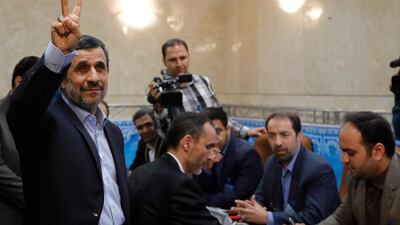Iran’s former president Mahmoud Ahmadinejad has challenged both the country’s Supreme Leader and the revolutionary guard militia’s stranglehold on the economy after some of his allies were detained on criminal charges.
The former president, who was barred from another tilt at the top job in last year’s election, has resorted to publishing open letters condemning the most powerful institutions in the country.
In a series of letters to Ayatollah Ali Khamenei, the Supreme Leader, he warned of the effects of the country’s economic decline. He claimed stultifying role of the Islamic Revolutionary Guard Corps (IRGC) in business needed to be tackled. “Do you think if I keep silent about the economic and political problems of our country they would go away by themselves?” he asked. “It is my revolutionary duty to warn that there is a widespread dissatisfaction among our nation about the performance of the system which is fast approaching the very foundations of our Islamic revolution”.
Mr Ahmadinejad’s camp has sought to capitalise on the growth of domestic discontent, highlighted by the nationwide street riots earlier this year, as the country’s economy has slipped deeper into a downturn.
This has fuelled fears that the ex-president hungers after a comeback and seen some members of his inner circle, who are loosely described as the “principalists”, come under intense legal pressure in recent months.
Delivering a televised Nowruz message on Tuesday, Mr Ahmadinejad took up the plight of his former deputy Esfandiar Rahim Mashie, who he noted had led a campaign for UN recognition of the Persian New Year festival.
Mr Ahmadinejad condemned the arrest of Mr Mashaie earlier this week on charges of publicly criticising a prison sentence imposed on Hamid Baghaie, another ex-deputy. Mr Baghaie has been imprisoned on fraud charges.
The backdrop to the row has been Mr Ahmedinejad’s two-pronged attack on the troubled economy and pervasive corruption, which the former president claims are linked. In particular he has attacked Iran’s judiciary and its head Ayatollah Amoli Larijani.
Experts agree that Mr Ahmedinjad has a point, even if his own presidency was marred by the same endemic flaws. “Iran’s economy is a complete mess”, the London-based economist Dr. Manochehr Farah-Bakhshah told National. “To be more precise, there is actually no economic system in place at all.
“More than 50 per cent of the economy is in the hands of the Revolutionary Guard and the so-called charities that are run by the office of the Supreme Leader Ali Khamenei. Around 30 percent of it is controlled by the government, and the rest is run by small struggling private enterprises. There is no meaningful investment in the industries and the banks are bankrupted. The country is fed through subsidies and imported goods”.
The irony that Iran’s current dire economic situation started during Ahmadinejad’s presidency is lost on his followers. It was his muddled policies on the one hand that eroded living standards just as international sanctions against Iran's underground nuclear programme reached a zenith.
On the first day of his presidency in 2005 Ahmadinejad had ordered the closure of Iran’s Organisation for Economic Policy and Budget Planning, which had survived the revolutionary purges of all the former Shah regime’s departments.
While inflation has been tamed, there has been little sign of the reforms that would deliver new growth. Entering his sixth years of office with the motto of “opening the closed doors to Iran’s economic prosperity”, President Hassan Rouhani has been unable to launch a fight corruption out of fears the move would destabilise the establishment.
Mr Ahmadinejad is clearly betting that the economic chaos that his own administration created will prevent the Rouhani administration from succeeding, thereby making his return to power easier.
As Mr Ahmadinejad and his supporters eye up a return to power they have presented their camp as the only hope of “the true spring of freedom and prosperity for the Iranians”. Yet the economic rhetoric strikes many as a proxy battle for power. Ayatollah Ruhollah Khomeini, the founder of the regime, once famously declared the “economy is a matter for donkeys”. The likelihood of true reform remains as remote as ever.
“They all have their backs to the wall. No one has any coherent economic plan for turning things round in Iran, because the regime is not reformable at all’, said Dr. Farah-Bakhsh.

